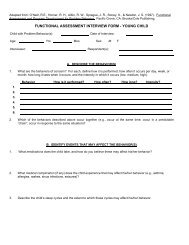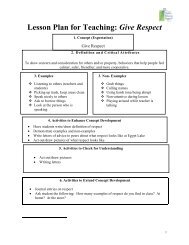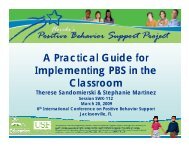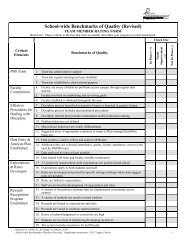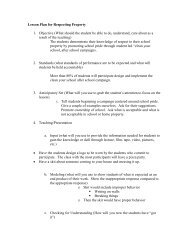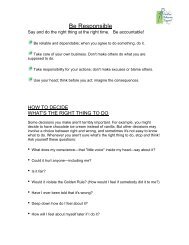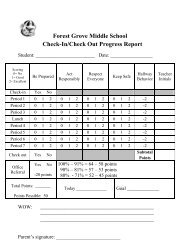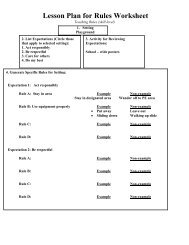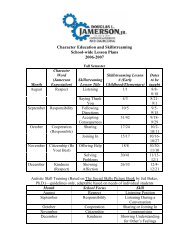Georgia PBS Interventions - Florida's Positive Behavior Support ...
Georgia PBS Interventions - Florida's Positive Behavior Support ...
Georgia PBS Interventions - Florida's Positive Behavior Support ...
- No tags were found...
Create successful ePaper yourself
Turn your PDF publications into a flip-book with our unique Google optimized e-Paper software.
Visual EnvironmentIf your child is visually distractible, simplify the visual field in his home or schoolfor a calming effect. Alternately, if your child seems visually "tuned out," i.e., does not seem torespond easily to visual stimulation, add brightly colored objects to attract visual attention. Forexample, a child who has trouble getting aroused for play may be attracted by a brightly painted toychest filled with appealing colored toys.Hide clutter in bins or boxes or behind curtains or doors—a simple, solid-color curtain hung over abookshelf instantly reduces visual clutter.Use solid colored rugs instead of patterned ones and solid-colored walls (for example, avoid patternedwallpaper).Have your child sit at the front of a classroom where there is less visual distraction. He may also needto sit away from the window to avoid the distraction of the outdoors. Keep in mind, however, that somechildren do best sitting in the back of the room so they can monitor what other children are doingwithout constantly turning around. Work with the teacher to see which seating arrangement worksbest for your child.Avoid toys, clothes, towels, etc., in colors that your child find stress-inducing such as bright orange,yellow, and red (your child may have a different "hated" color.)ScentsIf your child has sensory problems, certain odors can stimulate, calm, or send him into sensoryoverload. Explore scents with your child to find the ones that work best to meet your goal (either tocalm or to wake up). While everyone has different preferences, lavender, vanilla, and rose are generallycalming. Peppermint and lemon are usually invigorating. Let's say your child needs help staying calm andloves lavender. You can use lavender soaps and bath oils to ease bath time, lavender candles or oils inan aromatherapy burner or machine at bedtime, and lavender body lotion.If your child is overtired at the mall and you know scents help, have her smell her favorite scent orstop into a strongly-smelling store that sells candles and soaps.Play a smelling game with your SI child. Have her close her eyes or wear a blindfold and try to identifysmells such as maple syrup, apple, peanut butter, and soap.Life stinks sometimes. Accept your child's opinion about something she thinks smells "gross." Then helpher find something that smells nice.Strong tastes can stimulate the mouth of a child with SI and make him more willing to try new foods.Before presenting new foods, let the child have one peppermint, sour gummy bear, or other strongflavoredfood.If your child does not have a strong negative reaction to refined sugar (becomes very "hyper" or getsvery sleepy), get an assortment of flavored jellybeans. Eat one at a time, and have her guess whichflavor it is.Children will be more likely to taste something if they help make it. Let him or her help you selectfoods. For example, let him or her choose between chicken or fish, string beans or sugar snaps, and<strong>Positive</strong> <strong>Interventions</strong> and Effective Strategies Riffel -© 2005 - 86 -




